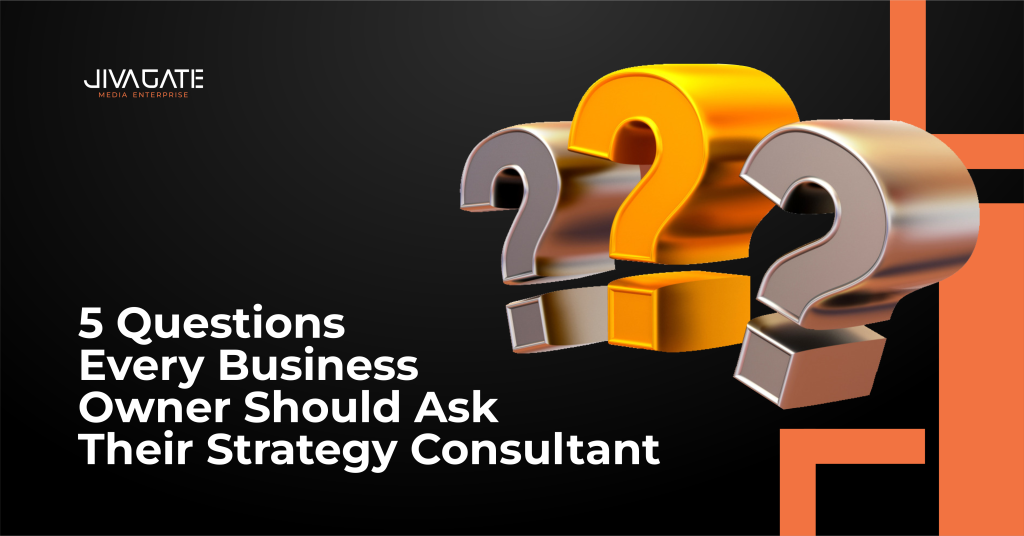Every successful business has one thing in common: a clear strategy. But strategy doesn’t live in spreadsheets or PowerPoint slides, it lives in the decisions you make, the direction you choose, and the outcomes you drive.
That’s why working with a strategy consultant can be one of the smartest moves for any business owner. They bring an outside lens, structured thinking, and the ability to help you pause, refocus, and move forward with clarity. However, not all consultants work in the same way, and the value you receive depends heavily on the questions you ask from the start.
Whether you’re just starting out or scaling up, here are five essential questions every business owner should ask their strategy consultant.

1. “What’s your approach to understanding my business?”
This is where it all begins. Before a consultant can help you grow, pivot, or optimize, they need to understand you—your model, your market, your mission, and your challenges.
Ask how they plan to get immersed in your business:
- Do they conduct interviews with your team?
- Will they review your internal documents, sales data, or customer feedback?
- How do they learn about your market and your unique positioning?
A strategic consultant or partner should dig deeper than surface-level observations. They should aim to understand:
- Your business model – How you make money, where value is created and delivered.
- Your audience – Who your customers are, what they value, how they buy.
- Your challenges and blind spots – What’s holding you back? What keeps you up at night?
A good consultant doesn’t jump straight into solutions. They take time to listen, ask thoughtful questions, study your operations, and get clear on what success looks like for you. Be wary of one-size-fits-all frameworks or generic plans. Strategy should feel personal, not templated.

2. “How do you balance short-term wins with long-term goals?”
A smart strategy doesn’t just aim for the future—it helps you move forward now.
Too often, businesses are handed a long-term strategy that feels exciting but impractical, or a short-term fix that doesn’t scale. You need both.
Make sure to ask:
- How will you help us prioritize quick wins without sacrificing long-term sustainability?
- How do you structure your recommendations so they create momentum while building foundational growth?
Great consultants understand the value of sequencing—what to fix first, what to optimize later, and how to build toward something bigger without burning out your resources.

3. “What kind of data or insight will guide our strategy?”
Strategy without insight is just guesswork, as informed decisions come from solid insights.
Be sure to ask:
- Do they rely on market research, customer insights, performance metrics?
- Will they conduct a SWOT analysis or competitor benchmarking?
- Do they integrate qualitative data (like employee or customer feedback) with quantitative data?
You want a consultant who doesn’t just tell you what to do—but shows you why it matters. Someone who can help you make sense of what the numbers are saying and what your market is demanding.
And equally important: can they help you interpret your data to discover hidden opportunities?

4. “How will we define and measure success together?”
Success looks different for every business. For one, it might mean increasing market share. For another, it could be improving internal efficiency or launching a new product line.
A strategy consultant should help you define your version of success, then build KPIs and performance metrics around it. This keeps everyone accountable and ensures that strategy isn’t just a document—it’s a living, evolving process tied to real results.
Make sure to ask:
- How will we measure progress—weekly, monthly, quarterly?
- What key performance indicators (KPIs) matter most for our specific goals?
- How will we adapt the strategy if something’s not working?
Whether it’s growing revenue, launching a product, improving customer retention, or entering a new market—your metrics should reflect your goals, not just industry benchmarks.
A consultant who builds a scorecard with you—and revisits it frequently—is invested in the long game.

5. “What happens after the strategy is delivered?”
Strategy is just the beginning. Implementation is where the real work begins—and where many plans fall flat. A good strategy document means nothing if it doesn’t get implemented. And implementation is often where businesses get stuck—teams feel overwhelmed, priorities shift, and the big ideas get shelved.
Be sure to ask:
- Will you support us during execution?
- Do you offer team training, implementation sprints, or ongoing advisory?
- How do you ensure knowledge transfer so our team is empowered?
Because you don’t just want a plan, you want a partner.

One of the most overlooked benefits of engaging a strategy consultant goes beyond the development of a plan—it’s about sharpening the way you think. A skilled consultant brings structure to complexity, clarity to vision, and the perspective needed to rise above daily operational demands.
That’s why asking the right questions matters. The right consultant won’t avoid the tough conversations, they’ll welcome them.
At Jivagate Consulting, we approach strategy as a collaborative process, one that empowers business leaders to see opportunities differently and move forward with intention. If you’re seeking a strategic partner to help you think clearer and lead smarter, we’re ready to support you. Contact us here.




